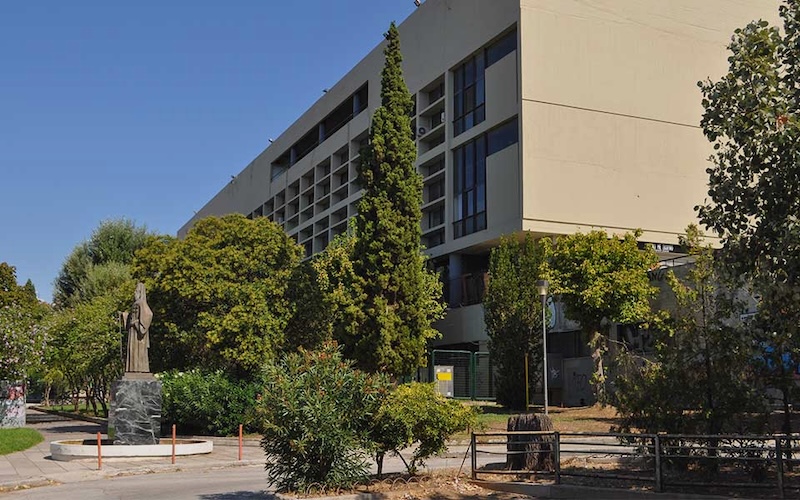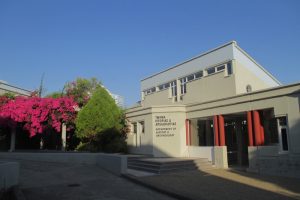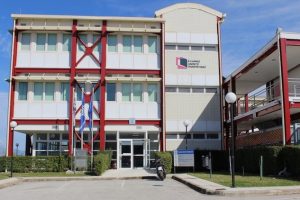
Aristotle University of Thessaloniki Greece
Aristotle University was officially founded in 1925 by a decree from the Greek government. It was established as a means of responding to the educational needs of northern Greece, particularly after the population exchanges that followed the Treaty of Lausanne (1923).
The university’s creation was directly tied to the growing importance of Thessaloniki as a commercial, cultural, and intellectual hub in the Balkans, It was initially intended to serve the region of Macedonia and to support the growing urban development of Thessaloniki. At the time, Thessaloniki had a significant Greek-speaking population, and the university aimed to provide higher education opportunities for the region’s residents.
By the 1980s, Aristotle University had firmly established itself as Greece’s largest and most prestigious university. Its influence grew not only within Greece but also in the Balkans and the wider Mediterranean region.
In the 1990s and 2000s, AUTh began to internationalize its programs, offering more English-language graduate programs and creating numerous partnerships with universities across Europe, the US, and Asia, Research output became a focal point during this period, with AUTh increasing its participation in international research collaborations, notably through programs funded by the European Union.
In the 21st century, the university continued to broaden its academic offerings, introducing new disciplines, particularly in fields like Information Technology, Biomedical Sciences, and Environmental Studies, The university’s infrastructure was modernized, with the construction of new research labs, student housing, and sports facilities, enhancing the overall student experience.

Research
AUTh hosts many research institutes and specialized centers across its various faculties and departments. These centers focus on a wide range of fields, from fundamental science to applied research in engineering, medicine, humanities, and social sciences.
Some of the university’s prominent research institutes include:
The Institute of Nuclear and Particle Physics
The Biomedical Research Institute
The Institute for the Protection of the Environment
The Laboratory for Earthquake Engineering
The Thessaloniki School of Journalism and Communication
The International Center for the Study of Balkan and Eastern Mediterranean Politics
Interdisciplinary Research
A key feature of research at AUTh is its interdisciplinary approach. The university actively encourages collaboration across departments and schools, allowing researchers from different fields to work together on common projects.
Research is not confined to traditional academic boundaries but is often focused on solving complex societal challenges, such as climate change, energy efficiency, healthcare, and digital transformation.
Research Groups and Laboratories
AUTh has over 1,000 research groups in various scientific disciplines. Many of these research groups are housed in modern laboratories equipped with cutting-edge technologies.
The university supports over 200 laboratories, many dedicated to fields like biotechnology, artificial intelligence, engineering, material science, and chemistry.
Focus Areas in Research
AUTh’s research spans numerous fields, with some areas being particularly strong and well-known both in Greece and internationally
Engineering and Technology
AUTh is renowned for its engineering research, particularly in areas such as civil engineering, electrical engineering, mechanical engineering, computer science, and telecommunications.
The university’s research contributes significantly to the development of smart cities, renewable energy technologies, transportation systems, and advanced manufacturing, Some notable research projects include work on robotics, artificial intelligence, nanotechnology, and materials science.
Medicine and Life Sciences
The Medical School at AUTh is a leader in biomedical research, particularly in fields like cancer research, cardiovascular diseases, neuroscience, and immunology. The Biomedical Research Institute and various laboratories are involved in cutting-edge studies to improve healthcare outcomes and treatment methods.
AUTh is involved in various clinical trials and drug development projects, often in collaboration with hospitals, pharmaceutical companies, and research organizations.
Natural Sciences
Research in the Natural Sciences includes fields like physics, chemistry, biology, environmental science, and geology.
In particular, earth sciences, including seismology, climate change, and environmental monitoring, are areas of strength.The university also conducts extensive space research, including collaborations with space agencies such as the European Space Agency (ESA) and other international partners.
Social Sciences and Humanities
AUTh’s research in the social sciences and humanities covers a wide range of topics, from sociology, anthropology, history, and political science to linguistics, philosophy, and arts.The university focuses on Balkan studies, Mediterranean culture, and global studies, reflecting the university’s strategic position in Southeast Europe.
Research also includes public policy, urban studies, and socio-economic issues, addressing critical contemporary challenges such as migration, economic development, and social justice.
Environmental and Climate Change Research
AUTh is a major player in the field of environmental studies, focusing on sustainable development, climate change mitigation, and biodiversity conservation.
Research projects also address the ecological impact of human activities, especially in the context of the Mediterranean region, where the effects of climate change are especially significant.
International Collaboration and Funding
AUTh is a strong participant in various EU-funded research programs, particularly through the Horizon 2020 framework and its successor, Horizon Europe.
The university collaborates with other European and global institutions on high-profile research projects. The university is involved in multinational research consortia focused on topics ranging from advanced materials to public health and artificial intelligence.
Global Partnerships
In addition to European collaborations, AUTh is involved in joint research Spin-offs and Industry Collaboration:
AUTh has a growing number of research spin-offs, companies formed from university-based research. These companies often focus on cutting-edge technologies, such as medical devices, IT solutions, and environmental technology.
The university collaborates with local and international industry players to apply research findings in real-world settings, which benefits both the academic community and the broader economy.
Research Publications and Impact
AUTh is ranked highly in terms of research output in Greece and is known for publishing in leading international peer-reviewed journals. Its academic publications cover a broad range of disciplines and contribute significantly to advancements in science, engineering, and the humanities.
The university also has a strong presence at international conferences, where it showcases its latest research findings and builds connections with researchers from around the world.
Aristotle University of Thessaloniki (AUTH) comprises several faculties, each offering a diverse range of programs and disciplines
| Faculties |
|---|
| Faculty of Social Sciences |
| Faculty of Sciences |
| Faculty of Medicine |
| Faculty of Sciences and Technology |
| Faculty of Education |
| Faculty Physical Education and Sport Science |
| Faculty of Engineering |
| Faculty of Business and Economics |
| Faculty of Agriculture |
| Faculty of Architecture |
| Faculty of Law |
| Faculty of Theology |
| Faculty of Fine Arts |
Campus and Facilities
The main campus is close to the city center, making it easily accessible from almost any part of Thessaloniki. It spans across a large area, covering around 230,000 square meters.
The campus is divided into different sections based on the various faculties, each having its own buildings, classrooms, laboratories, and research spaces. Many of the buildings are modern, while others have classic Greek architecture, which gives the university a unique, historical charm.
Academic Buildings and Departments
The university is home to a wide range of academic buildings spread across its 11 faculties. Each faculty has its own dedicated teaching and research spaces. Some of the most prominent faculties (such as Engineering, Medicine, and Arts) feature state-of-the-art labs, classrooms, and lecture halls.
Libraries and Study Spaces
The Aristotle University Library is one of the largest academic libraries in Greece, offering access to a wide range of books, journals, and electronic resources. It serves as a central hub for research and academic work.
It includes a digital library with a variety of online resources, databases, and e-journals, making it a key asset for both undergraduate and postgraduate students.
The library offers individual study rooms, group study spaces, and areas for collaborative work, Each faculty has its own library tailored to its disciplines, providing specialized resources for students and researchers in fields like engineering, sciences, and humanities.
Laboratories
Laboratories across the various faculties cater to the specific needs of students and researchers, such as computer labs, chemistry labs, and medical research facilities.
Sports Facilities
AUTh places great emphasis on student well-being and physical activity. The university offers a variety of sports and recreational activities through its Sports Center (Athlitiko Kentro), The Sports Center includes indoor and outdoor courts for basketball, volleyball, and tennis.
There’s a swimming pool, gyms, and facilities for track and field, It also offers fitness classes, yoga, aerobics, and other group sports activities.
Outdoor Spaces
The campus features a number of green spaces, open areas, and gardens where students can relax, study outdoors, or engage in informal activities. These areas are popular for socializing, relaxation, and student events.
Student Accommodation
While the university does not have extensive on-campus housing, several student dormitories are nearby. Many students find private accommodation or rent apartments in Thessaloniki, which is known for its vibrant student population.
Cultural Centers
The university also runs various cultural centers and organizes exhibitions, theater performances, concerts, and other artistic events. These centers are an integral part of student life at AUTh, fostering a creative and collaborative atmosphere.
Student Organizations and Clubs
AUTh has a rich history of student involvement, with numerous student clubs and organizations catering to academic, cultural, and social interests. From sports teams to theater groups and academic societies, there’s something for every student. The university regularly organizes student festivals, concerts, and art exhibitions, which are integral to the student experience.
| Courses in English | Bachelor | Masters | PHD |
|---|---|---|---|
| Computer Science | BSC | MSC | PHD |
| Mathematics | BSC | MSC | PHD |
| Biology | – | MSC | PHD |
| Marketing | BSC | MSC | – |
| International Economics | BSC | MSC | – |
| Public Health | BSC | MSC | – |
| Medicine | BSC | MSC | PHD |
| Business Administration | BSC | MSC | PHD |
| Sociology | BSC | MSC | – |
| Medicine | BSC | MSC | PHD |
| Biotechnology | BSC | MSC | PHD |
| Political science | BSC | MSC | PHD |
| Philosophy | BSC | MSC | PHD |
| Linguistics | BSC | MSC | PHD |
| Chemistry | – | MSC | PHD |
| Physics | – | MSC | PHD |
| Information technology | BSC | MSC | PHD |
| Photonics and nanotechnology | – | MSC | PHD |
The admission requirements for Aristotle University of Thessaloniki vary depending on the level of study (undergraduate, graduate, or doctoral) and whether the applicant is a domestic or international students
Undergraduate Admission Requirements for International Students
For undergraduate programs, the majority of courses are taught in Greek, so proficiency in the Greek language is typically required. However, some departments or programs offer courses in English (especially for exchange students or those in Erasmus+ programs), but the availability of these is limited at the undergraduate level.
Requirements
Secondary Education Completion
Applicants must have completed their secondary education (high school diploma) equivalent to the Greek “Apolytirion”. The diploma must be recognized by the Greek Ministry of Education or the relevant authorities in the applicant’s home country.
Language Proficiency
Greek Language
Since most undergraduate courses are taught in Greek, international students typically need to prove proficiency in Greek. The required level of proficiency is usually B2 or higher, which corresponds to an intermediate level of fluency.
To demonstrate proficiency, students may need to submit results from recognized language tests like the Greek Certificate of Language Proficiency or Greek Language exams for foreigners (specifically the KPG exams).
English Language
programs or courses taught in English, proficiency in English is required. Accepted qualifications include
TOEFL (minimum score of 80–90)
IELTS (minimum score of 6.5–7.0)
Cambridge English Certificates (C1 or C2)
Required Documents
Secondary school diploma (translated into Greek or English)
Official transcripts of the final years of secondary school (translated into Greek or English)
Proof of language proficiency (Greek or English, depending on the program)
Passport copy
A personal statement (sometimes required)
Letters of recommendation (if required by specific departments)
Medical certificate (sometimes required)
Entrance Exams
Some undergraduate programs might require entrance exams, especially in fields like Medicine, Engineering, and Law. These exams are typically based on the subjects taught in the Greek education system, and there might be specific preparation required.
Graduate Admission Requirements (Master’s and PhD Programs)
Graduate programs (Master’s and PhD) at AUTh often offer courses in English, and the requirements for these programs are generally less stringent regarding Greek language proficiency. However, specific requirements may vary by department.
Master’s Programs (MSc / MA) in English
Bachelor’s Degree
Applicants must have a Bachelor’s degree from a recognized university, which is equivalent to a Greek undergraduate degree.
Language Proficiency
English Proficiency: Since many graduate programs are taught in English, a minimum level of proficiency in the English language is required. Accepted tests include:
TOEFL (minimum 80–90)
IELTS (minimum 6.5–7.0)
Cambridge English Certificates (C1 or C2)
Some programs might also accept a Bachelor’s degree taught in English as proof of language proficiency.
Application Documents
Bachelor’s degree (translated into Greek or English)
Official transcripts from previous higher education institutions
Curriculum Vitae (CV)
Statement of Purpose (SOP)
Letters of Recommendation (usually 2)
Proof of English language proficiency (TOEFL, IELTS, etc.)
Passport copy
Entrance Exams
Some Master’s programs may require an entrance exam or an interview as part of the selection process, particularly in more competitive fields such as engineering, business, or medicine.
PhD Programs
Master’s Degree: Most PhD programs at AUTh require applicants to hold a Master’s degree (or equivalent) in a relevant field.
Research Proposal: Applicants must submit a research proposal outlining their intended area of study. This is essential for the application process, as it helps determine if a suitable supervisor and research resources are available at the university.
English Proficiency: As with Master’s programs, applicants are usually required to demonstrate English proficiency through tests like TOEFL or IELTS unless their prior education was conducted in English.
Application Documents
Master’s degree and academic transcripts
Research proposal
Letters of Recommendation
Curriculum Vitae (CV)
Proof of English language proficiency
Passport copy
Specific Requirements for Certain Programs:
Some programs, such as Medicine or Law, may have additional specific requirements, such as relevant professional experience, an interview, or additional entrance exams.
Application Deadlines
Undergraduate Programs Deadlines for non-EU students usually fall between April and July for the fall semester (October start), but deadlines can vary by program. Some programs may have rolling admissions.
Graduate Programs
Deadlines for graduate programs are typically earlier, around March to May for September intake, but this also varies by program.
Visa and Residence Permit
Non-EU students will need to apply for a student visa to study in Greece. After arriving in Greece, they must also apply for a residence permit for the duration of their studies. Both processes require:
Acceptance letter from AUTh
Proof of financial support (to show you can cover tuition fees and living expenses)
Health insurance
ljslaJLKJDLKajdlkajLKDJLKAjdlkAJLAKAKL
You may also like

University of Thrace Greece

University of Crete Greece

